
We’ve all had those days. No matter how hard you try, you can’t focus. Everything is harder than usual and heaven forbid anyone needs you to be creative.
It’s demoralizing, stressful, and makes you incredibly inefficient. That’s why it’s important to know how to get inspired.
A word of warning, however, as this post will give you techniques to help consistently find your inspiration. These tips won’t always work (everyone’s muse is different) and so it’s best to take these practices and experiment to see what works for you.
We’ll cover useful practices such as:
- How to keep a positive mindset and be more productive
- Actions to inspire you whether you’re alone or with others
- How to recapture that spark once it starts to fade
- Changing your routine (how, when, and why)
But enough blabbering – it’s time to get inspired!
How to get inspired
Accept that it can’t be forced
Inspiration cannot be forced. Anyone who says otherwise hasn’t spent hours laboring over the same piece of work with nothing but a blank mind full of frustration.
The sooner you accept this, the easier it will be to capture that lightning in a bottle and get inspired once more.
I’m no psychologist but I seem to produce my best ideas and work at the most unexpected times. The harder I try to force myself to generate ideas, the harder it is and the worse the final results tend to be.
So accept it.
Take a deep breath in, blow out your frustration, and start on something else. If possible either take a break or work on something less creative to let your mind recuperate and process the information you’ve given it.
Speaking of which…
Take a walk

My grandad always said that a walk in the fresh air would “blow away the cobwebs” and help rational thought to shine through. While hardly scientific, it’s hard to argue with the result.
One of the most common ways I get stuck in a rut is by sitting behind my desk for hours, moving only to refresh my drink and go to the restroom. It’s easy to convince myself that I can take a proper break once I’ve pushed through one more task, only to have that cycle into hours of further work.
It doesn’t matter how much of a roll you’re on – the longer you go without a break, the more inefficient your work will be. This is especially true for creative work which needs some degree of inspiration to carry out.
Go outside. Stay off your phone. Take a slow walk and enjoy the scenery. Let your mind wander but try to avoid focusing on any topic too hard.
In short, give your head a break. You’ll need it if you want to generate good ideas once more.
Listen to instrumental music
After years of experimentation, I can safely say that almost any instrumental music can help your focus and creativity while working.
From classical to electronic, chiptune to game soundtracks, I’ve tried almost everything in my efforts to help stay focused and keep my mind engaged. That way it’s easier for me to clear out my tasks before they stagnate and grind me to a halt.
As for why instrumental music is good for this, you don’t want to be listening to something which is too distracting. While it’s different for everyone, most find that anything with a singer (or too fast/heavy a beat) catches their attention and breaks their train of thought.
Again, it’s different for everyone, but I’ve found that most instrumental music will work so long as it’s not too loud, doesn’t have a heavy beat, and you change the genre of music every so often.
The whole point is to help your mind relax and flow into that ideal state of inspiration. That’s difficult to do if you’re lost in your background music or so used to it that it has no effect.
Change your routine
Routines are fantastic. They’re a powerful tool in helping us create good habits, eliminate bad ones, and get the most out of our time. Heck, having a daily routine is often the best way to keep yourself organized and focused.
However, much like listening to the same song on repeat, a stagnant routine will only hurt whoever is using it.
Doing the same thing, day-in and day-out is a great way to get frustrated with the routine and allow your mind to tune out and avoid engaging in your tasks. Ideas are hard to come by because you’re so used to doing things in a certain way that there’s seemingly no need to change anything or think of something new.
That’s why you need to break your routine every so often.
I’m not saying you have to take up a new extreme sport every month, but even a small change to your regular routine can truly work wonders for keeping your mind engaged.
Not to mention that the best way to generate new ideas is to supply yourself with new sights and experiences (more on that below). So, instead of the usual routine, try switching things up no matter how small the change is.
If you commute, try going to work a different way than usual and taking in the sights. If you work at home, why not use a different room or head out to a coffee shop for the day? Hell, even changing the grocery store you visit can be great for new ideas.
For example, if you use a scheduled checklist for your daily routine you could just edit the template in minor ways to keep the recurring checklists fresh and engaging.
Fuel the body, fuel the mind
Have you ever skipped breakfast and then noticed how bad your work day went? That’s because your body didn’t get the fuel it needed to perform its tasks.
The same is true of your mind. If you want it to generate ideas, you need to give it something to work with. New experiences and/or knowledge is the only way to do this.
For example, take Sting – one of the best-selling music artist of all time. He didn’t come up with so many well-known songs by sticking to the same routine. Englishman in New York, for example, was written after spending several days with famous gay author Quentin Crisp (the titular outcast) who had moved there from London.
Here are a few easy ways to give your mind the fuel it needs to get inspired:
- Read a book related to your desired topic
- Learn about key figures in the field
- Check out their work and why they’re popular
- Listen to podcasts while you travel
- Set up an RSS feed to help you read more
The more you know, the easier it will be to come up with new ideas. Speaking of which, if you’re looking for marketing ideas than check out Lauren Holiday‘s post on the best marketing resources – it’s a great list that’s helped our team out of some tight spots.
Talk to yourself
Yes, it sounds odd, but if you work remotely or spend a lot of time by yourself it can be incredibly useful to talk out loud.
I, for example, speak each sentence as I write it whether or not I’m using dictation software. This helps me to check that my work makes sense and flows nicely, reducing the need to perform major edits.
The idea here, however, isn’t to make your tasks more efficient or to find some magic shortcut. We’re looking for inspiration, and a great way to do that is to start a new train of thought which can then be followed to its logical conclusion.
Take my article on call to action examples. Without speaking out loud and teasing the ideas out of the source material, that article would be the same as everything else on the topic – a vague and only mildly useful account of why contrasting colors make for good buttons.
Instead, I was able to trace back the most likely motive for each CTA and thus provide a more valuable insight as to what they were designed to do and how they attempted to achieve that.
That or I like hearing the sound of my own voice. Either way, give it a shot.
Getting inspiration from others

Sometimes it’s not enough to rely on yourself for inspiration. Indeed, it’s often a great idea to get a second opinion on your work and thoughts, as this will let you cover several viewpoints and use experience beyond your own.
As such, here are a few tips on how to get inspired with a little help from others.
Note that most of these exercises can be performed with anyone, so you’re not limited to fellows or experts in the field. Getting a fresh viewpoint is often just the ticket for tackling the topic from a much needed new standpoint.
After all, it’s all too easy to talk from experience which your audience might not have or even appreciate.
Meet with others in the target field
The quickest way to get inspiration for a new project or theory is to talk with others who are in the related field. This lets you learn from their greater (or different) experience to your own and provides a separate viewpoint on the topic you want to cover.
If you can meet with someone more experienced than yourself it can also prove to be a great learning experience, and I’ve already mentioned how knowledge is key for inspiration.
The meeting doesn’t have to be long or physical – a quick chat on Twitter is by phone can be enough to help you out, depending on how complex the topic is. In fact, due to the other person’s limited free time, social media is often the best way to reach out to someone who you’re not already acquainted with.
Alternatively, you could use a video conferencing app to get the most out of your experience. For reference, here’s a handy table from our review of the top apps.
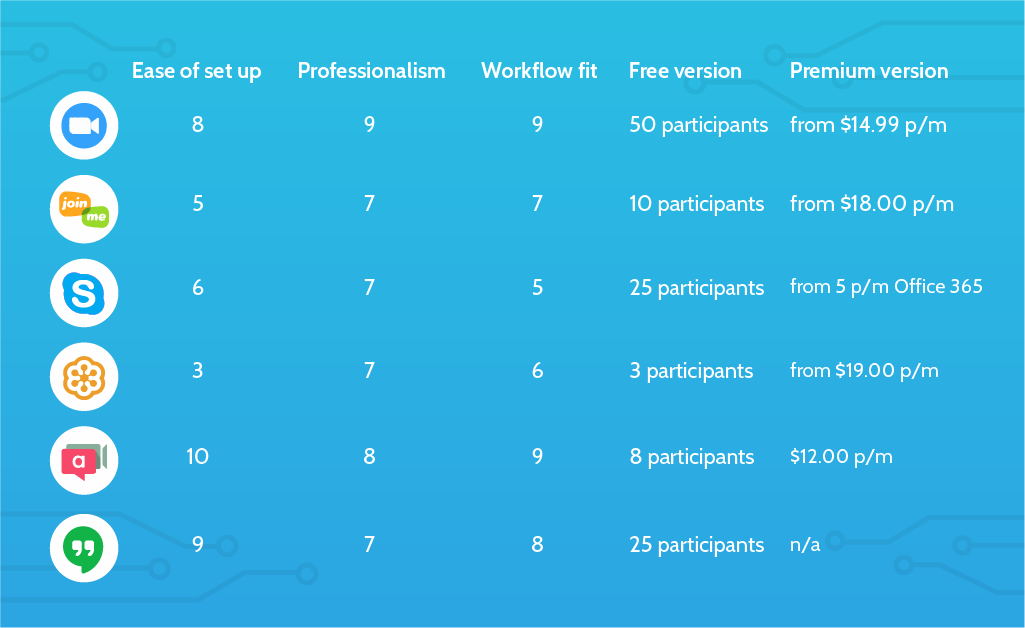
Either way, link up however you can and chat about anything and everything relating to the topic you want to get inspiration for. If you’re lucky they may even supply some ideas of their own which you could use.
Bounce ideas off anyone who’ll listen
Failing a meeting with those in your target field, it’s still a good idea to spend time with (and bounce ideas off of) anyone you can.
Friends, family, you name it. If you’re comfortable talking to them and think they might be able to understand the topic, don’t hesitate to dive in and ask them what they think.
Much like meeting with colleagues, this is a great way to get a fresh opinion on any ideas you have and help decide whether they’re worth pursuing. Plus, it’s always useful to have someone else to help develop any ideas and get you inspired.
Even if they can’t contribute ideas of their own, it’s useful to take the opportunity to explain the topic in detail, as this has its own benefits. Speaking of which…
Explain or teach something

It’s also worth meeting with people who have little to no understanding of what you’re talking about or focusing on, as this will let you attempt to explain the idea (or teach the concept) from the ground-up.
While this is more of a side-note for once inspiration has struck, it’s nonetheless a brilliant way to define your ideas properly and figure out whether they’re worth pursuing. If the idea doesn’t make sense to them or you upon explanation, chances are that you’ll need to change your perspective a little or start from scratch.
The value of this does depend on what audience you’re aiming to address, as a more technically proficient one might not need the high-level introduction that the person you’re talking to will. However, it’s all too easy to get lost in the details of your idea and ignore glaring faults in the big picture.
These issues can be avoided easily – all you need is someone else to say “that doesn’t make sense”.
Listen
Whether you’re meeting with someone for a chat or sitting in a coffee shop and watching the world go by, it always pays to sit back and listen.
If you’re in conversation then focusing on the other person’s words is not only polite but the only way to make sure you get everything you can out of the interaction. A conversation that you don’t listen to is just wasted time, after all.
Plus it’s always fun to listen to strangers as they go about their lives.
Most of what you’ll hear will be useless but I’ve had many a great idea inspired by snippets of conversation I’ve overheard in passing. From topics to cover to viewpoints to consider and factors you’ve overlooked, it’s silly not to take advantage of everything that’s going on around you.
This also plays into how new experiences fuel inspiration; chances are that most people will have different experiences to your own.
Tips for getting inspired
While I’ve already covered the primary methods of getting inspired and getting in the right mindset to let the ideas flow, there are a couple of things you can do to help the process along.
Now, as with most of these techniques, these won’t work for everyone and so you’ll need to test them and see what’s best for you. I find that new hobbies, altered targets, and the ability to just start writing have been most useful but it’s worth trying all of them sooner or later.
Plus, if you’ve used these techniques for a while and find your inspiration lacking once more, the best thing to do is mix up your routine (as mentioned earlier). If you originally found inspiration with painting, try going for a swim every other day, and so on.
Pick up a new hobby
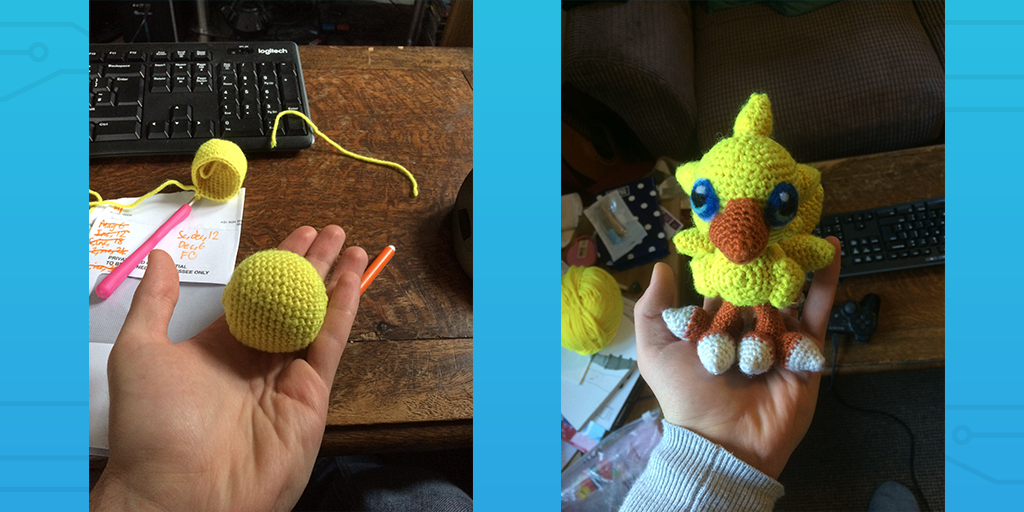
The single most useful tip I have for kickstarting your failing inspiration is to pick up a new hobby.
While the other tips above are more consistent, I tend to get frustrated with myself for the way a regular daily workflow saps my creativity. I’ll find a new way to get inspired and keep it up, only to have my output drop again a few weeks later once the novelty has worn off.
New hobbies largely help to stop that from happening. This is due to both being a new experience for your brain to process and to breaking up your regular routine to stop your own stagnation.
Plus, in the modern age of the internet there’s no excuse for not giving something a go.
For example, in the last year and a half I’ve taught myself how to:
- Play piano (badly)
- Speak Italian (even worse)
- Crochet (to my housemate’s amusement)
- Whittle (to my nephew’s amazement)
- Play various songs on guitar (I’ve played for years but new songs are a good refresher)
- Play various video games
As you can see, it doesn’t have to stick for long, be difficult or a big project or even be successful. The main value is in supplying the new experience to draw from with your inspiration.
If you’re unsure as to what to pick up, I’d recommend starting with a musical instrument which is easy to pick up and play, such as a guitar, harmonica, or even violin. Remote work allows me to keep my guitar by my desk and play a few chords while thinking of my next post and (believe it or not) Einstein did the same with his violin.
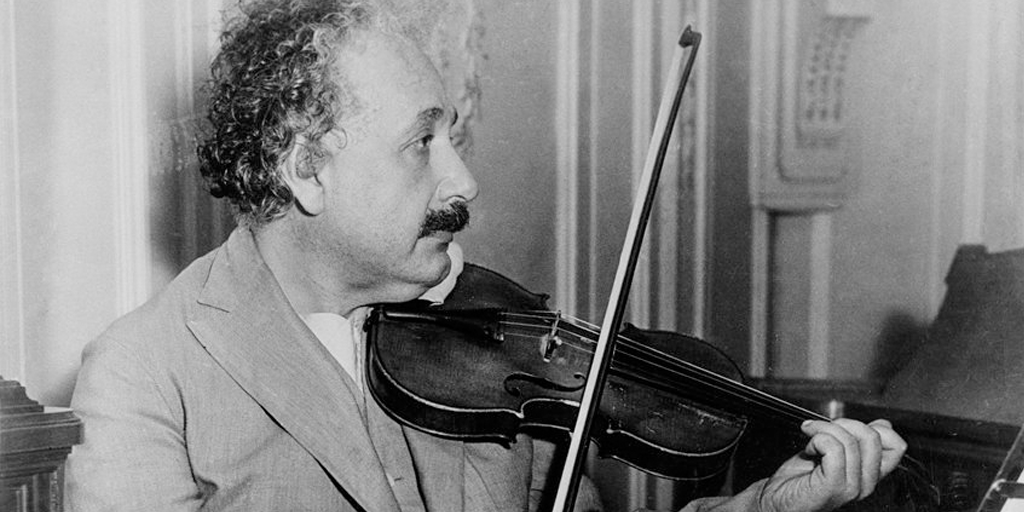
You wouldn’t bet against Einstein’s methods, would you?
Exercise (trust me, it works)
I’ve never been a sporty guy. Despite being a “Small” for the first time in my life, I still don’t exercise to any regular degree.
However, even I will attest to the power of exercise in fueling your mind and generating ideas. Not to mention the positive mood boost that comes with a pounding heart rate.
I’ve talked about this already in our post on office exercises but you don’t need to do anything fancy. Literally anything is better than nothing, even if that means a short walk during your work break or 10 minutes of jump rope every other day.
Plus, even if it doesn’t help to clear your head and get you inspired, it’s a lot more interesting (and healthier) than sitting in an office chair all day.
Test methods of creative work
Following the same theme of breaking up your routine, try varying the way you do your creative work or take notes. This can make doing the same work feel different enough that it once more becomes engaging, and can help to highlight connections and points that you may not have reached otherwise.
Some methods you could try out are:
- Talking yourself through an argument
- Bouncing ideas off of others
- Brainstorming (on a board, some paper, or in a notepad)
- Bullet journaling
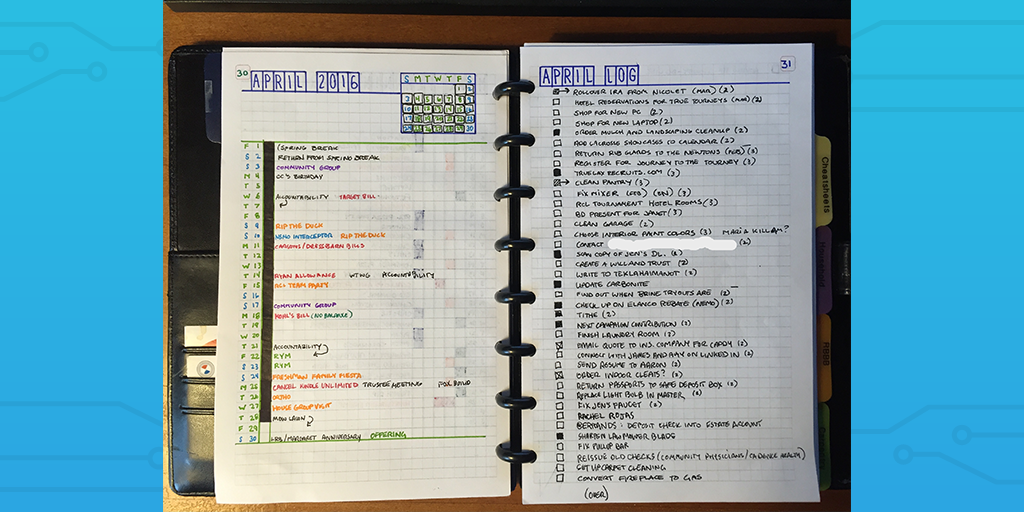
The method itself doesn’t matter too much if all you’re looking for is inspiration. While brainstorming might be better than bullet journaling for single sessions, the value for us is in getting your train of thought started.
Once you have several starting points it’s just a matter of clarifying them and seeing which is the best to take further.
Just start writing
Speaking of getting to a starting point, if you’re struggling then it’s often best to simply start writing. Starting is always the hardest and most overwhelming part of any project, so it’s best to get that step out of the way as soon as possible to give yourself a chance to build momentum and let your flow guide you through the rest.
Don’t know what to write? Write about not knowing.
Write about what you had for breakfast. Compare it to yesterday. Remember that time the toaster needed replacing after getting angry with a (then burnt) crumpet.
Point is, it doesn’t matter what you write about at first. Just start writing and let your brain do the rest.
For example, this post was originally scheduled to be about the golden age of productivity. After struggling for hours to come up with an angle, I wrote most of this article in a single afternoon out of frustration from my lack of inspiration.
Don’t beat yourself up
One of my biggest problems used to be that I would beat myself up over not doing as well as I thought I could be. This would cause my mood to dip, which would slow down my work, which would make me even more stubborn and critical, and the cycle continued.
This is a terrible way to work.
Not only are you stressing yourself out but the speed and quality of your work will suffer due to that stress. Instead, it’s much better to accept what you’ve done, put it into perspective, and be thankful for any small victories.
It’s hard enough to get inspired when you’re in a good mood, let alone when you’re in a self-imposed mental deadlock because you accidentally daydreamed for the last 20 minutes.
Try reducing/altering your targets
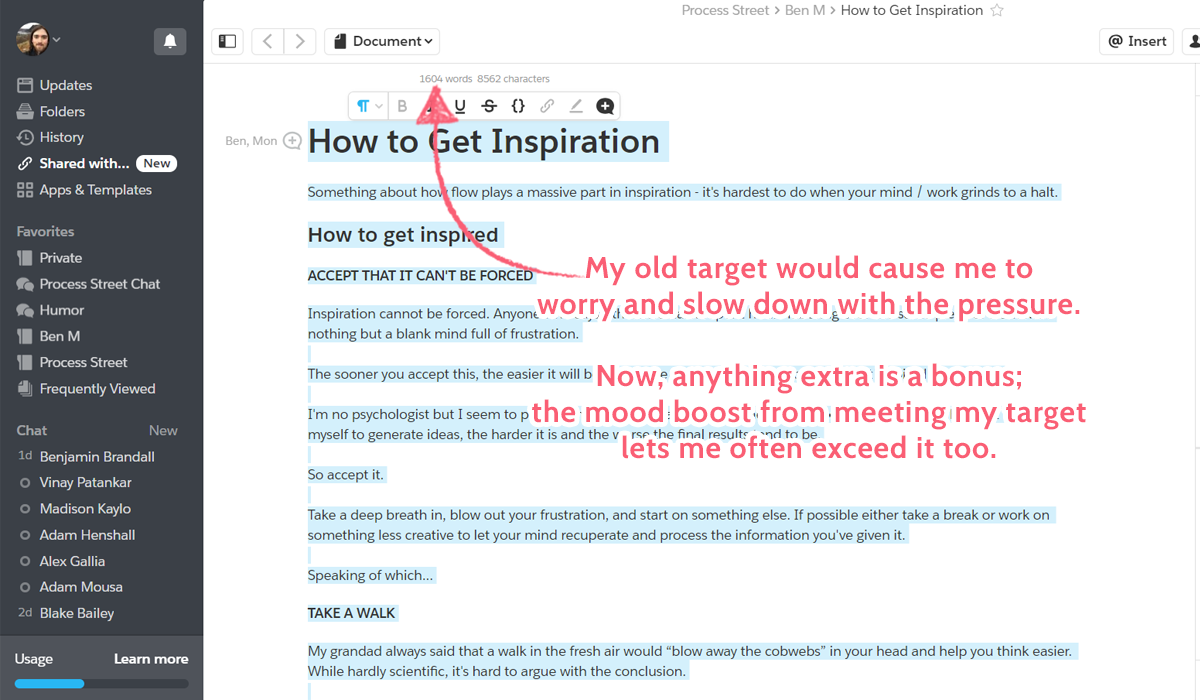
Another factor which severely impacted my stress levels, quality of work, and general inspiration was the work targets I’d imposed on myself.
On a good day, I know that I can comfortably write around 2,000 words of content. This turned into the thought that I should always be writing 2,000 words each day because, in my mind, I had no excuse not to.
The result was obvious in hindsight – a lot more stress, extended hours, and unintentionally padded word counts. I wouldn’t waffle but I’m certain my work could have been more direct.
Nowadays I aim for 1,000 words per day and my work flows much easier for it. Ideas come naturally due to the lower stress, projects are easier to start due to the lower expectations weighing down on me, and as a result my momentum picks up sooner.
Ironically, by reducing my target word count by half per day I’m often getting the same amount or more done. Equally, this means that on truly terrible days where all I can muster is a few hundred words among research, running through my editing checklist, and other tasks, it’s easier to let the failure go and start with a clear head the next day.
Inspiration isn’t consistent – the key is to keep trying new things
As I’ve said time and again, the main thing to remember is that inspiration and creativity aren’t consistent. If there was a set formula or some easy “hacks” to kickstart a great idea I wouldn’t be writing this post and you wouldn’t be reading it.
Sure, it’s disheartening when your new routine that worked so well starts to become the norm and you run into the same problems once more. Nevertheless, that’s just how things are – the key is to keep trying new things and to accept that you’ll have good and bad days.
Don’t get frustrated and beat yourself up over it. Take a break, relax, then try something new to get inspired once more.
How do you get inspired? I’d love to hear any tips you have in the comments below.







 Workflows
Workflows Projects
Projects Data Sets
Data Sets Forms
Forms Pages
Pages Automations
Automations Analytics
Analytics Apps
Apps Integrations
Integrations
 Property management
Property management
 Human resources
Human resources
 Customer management
Customer management
 Information technology
Information technology



Ben Mulholland
Ben Mulholland is an Editor at Process Street, and winds down with a casual article or two on Mulholland Writing. Find him on Twitter here.